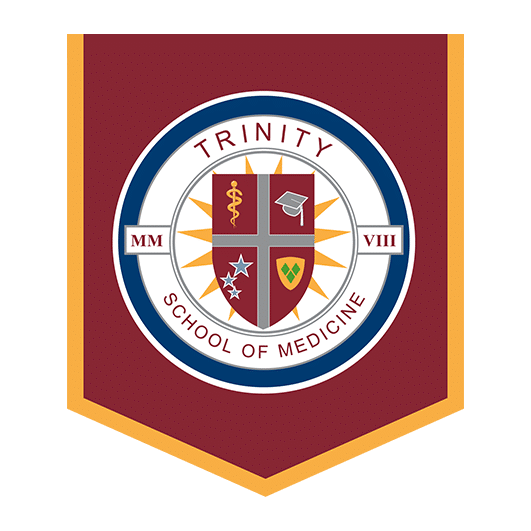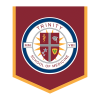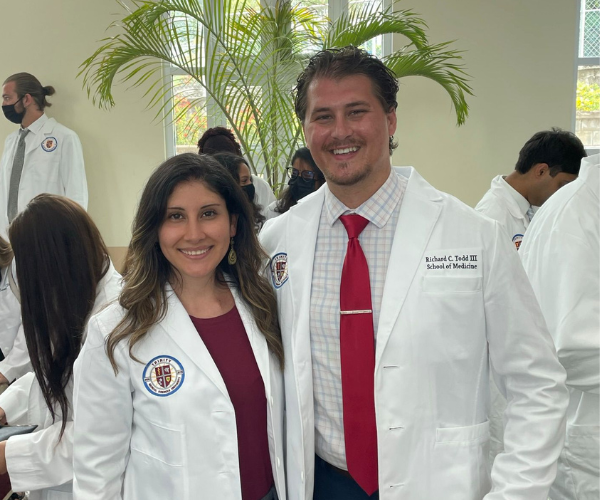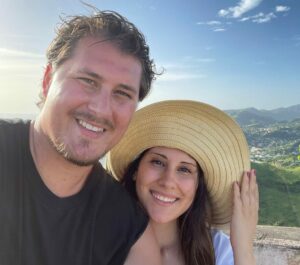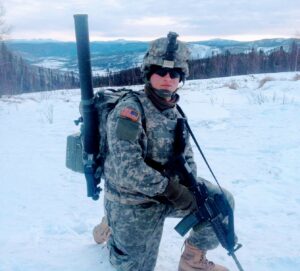Most doctors and medical students will tell you that they always dreamed of becoming a physician. But before becoming a Trinity student, Richard Todd had to follow a path that doesn’t usually lead to success. A native of Clearwater, Florida, Richard shared that as a young man he never thought college would be an option.
“I dropped out of high school in 10th grade at the age of 16. I came from a broken household. A single mother consumed by alcoholism doing her best to raise three children on her own. I went on to get my GED and enlisted into the United States Army as an Infantryman to escape where I came from.”
After completing his time in the U.S. Army, Richard decided to take a chance on himself by enrolling in community college, where he supported himself by earning scholarships, tutoring, maintaining exceptional grades, and feeding his appetite to learn all things science. This led to him being accepted into nursing school and earning his RN degree. Now, he is using his nursing degree as the foundation to build an even more monumental career. The future Dr. Todd is now in his 5th term of medical school, studying for his upcoming CBSEs (Comprehensive Basic Science Examination), after which, he will go on to complete his USMLE Step 1 exam.
We recently sat down with Richard Todd to ask him about his journey to med school and life as a Trinity student.
What is it that inspired you to pursue the path you are on now?
First and foremost, what brought me into medicine was a belief that I could do it. I think we all wrestle with believing in ourselves, especially as a non-traditional student. So most importantly, you need to believe and have faith in yourself. When you take that leap and believe in yourself, I think you’ll be surprised how far you can go.
Most prospective students are interested in hearing what the admissions process is like. Could you share your experience?
Regarding Trinity’s admissions process, it was pretty lightning fast. They wanted me to submit a personal statement and then they got on a skype call with me. They felt me out, I was feeling them out. I saw there was a close-knit family-type feel. They made me feel comfortable. Obviously comfortable enough for me to move halfway across the world to a Caribbean island! You put a lot of trust in the system and the system puts a lot of trust in you. It’s important to have a mutual fit to see how far we can go together. It’s a symbiotic relationship.
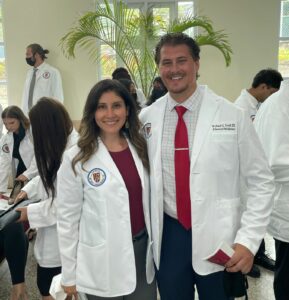
Being former military, I was used to hopping around. So for me, it wasn’t too hard of a transition. But someone who isn’t used to doing that, just being away from their mother and father, I could see how that transition could take some getting used to. But we have a lot of groups with Trinity you can get involved in, which is what I did. Along with my fiancé (fellow Trinity student Abby Jacob), I founded Operation: Healing Smiles, where we raise money for St. Benedict’s orphanage in St. Vincent. I was also able to participate on the welcome committee and even led an expedition to the La Soufrière volcano. So you can stay busy, but also stay oriented on what the goal is — to pass and be successful.
The next big milestone in your medical education is taking your CBSE exam. Do you feel Trinity is giving you every resource you need to be successful on that exam?
Trinity gives us the tools we need to be successful on CBSE. The school does a great job of bringing in alumni and other physicians that are willing to come in on their time off and educate us on systems-based reviews.
CBSE exam prep aside, how else has Trinity supported you so far in your medical education?
One thing I would point out is that Trinity’s faculty do a great job with having an open-door policy. On the island, everyone bends over backward to make sure that you have the tools you need to be successful. Dr. Cartwright, who leads Term 5 basic science review in Warner Robins, organizes sessions with psychologists for mental healthcare if students want to come and do group therapy, which is fantastic because medical school gets stressful.
The school is very close-knit. Everybody knows each other. There’s not really so much of a competitive feel to it. It’s more of an inclusive let’s-get-through-this-together type of mentality.
Thinking about the future, where do you hope to see yourself when it’s time to participate in the Match?
As far as matching goes, as a former infantryman, I’d love to pursue psychiatry as a specialty. I want to give back to my veteran population as well as more transient populations.
Speaking of being a veteran, how would you say your time as an infantryman shaped how you saw your future post-service?
I think a lot of veterans when they get out miss the sense of intensity and draw of a higher purpose. Motivated veterans use their experience to become high-achieving leaders in private industry. I think reflecting on tough times in the Army, especially in the Infantry, helps dial in on what the mission is. The hardest part for transitioning veterans is understanding you have to drive your own success.
What is the best piece of advice you can give to someone wanting to pursue their MD?
Medical school is an independent race that we all run together. Don’t be detracted by other people’s performances and don’t be detracted when you have a bad day. You can always bounce back. Stay focused and know why you’re there. If your goal is to become a physician, and you drive hard, I believe that you can become a physician.
Advice for other veterans looking to pursue medicine would be first and foremost to target the correct headspace and drive to pursue medicine. It doesn’t matter where you come from or if you’re the first college graduate in your family. It’s up to you to change the trajectory of your future. If you have a story tell it, let others draw strength from the path you walk!
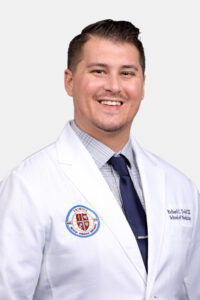
A note for Veterans:
Trinity is proud to participate in the Yellow Ribbon Program, a provision of the Post-9/11 Veterans Educational Assistance Act of 2008. This program allows degree-granting institutions of higher learning to voluntarily enter into an agreement with the U.S. Department of Veteran Affairs to fund tuition expenses that exceed the annual VA tuition and fees benefit.
If you’re interested in learning more about how Trinity keeps student success at the core of its mission, we invite you to reach out to our admissions team today.
